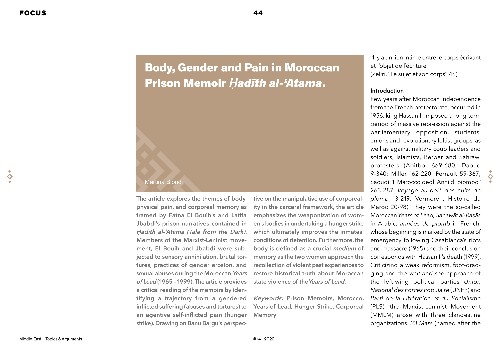Body, Gender and Pain in Moroccan Prison Memoir Ḥadīth al-‘Atama
The article explores the themes of body, physical pain, and corporeal memory as framed by Fatna El Bouih’s and Latifa Jbabdi’s prison narratives contained in Ḥadīth al-‘Atama (Tale from the Dark). Members of the Marxist-Leninist movement, El Bouih and Jbabdi were subjected to sensory annihilation, b...
में बचाया:
| में प्रकाशित: | Middle East - Topics & Arguments |
|---|---|
| मुख्य लेखक: | |
| स्वरूप: | Artikel (Zeitschrift) |
| भाषा: | अंग्रेज़ी |
| प्रकाशित: |
Philipps-Universität Marburg
2020
|
| विषय: | |
| ऑनलाइन पहुंच: | ऑनलाइन पहुंच |
| टैग: |
टैग जोड़ें
कोई टैग नहीं, इस रिकॉर्ड को टैग करने वाले पहले व्यक्ति बनें!
|
| सारांश: | The article explores the themes of body, physical pain, and corporeal memory as framed by Fatna El Bouih’s and Latifa Jbabdi’s prison narratives contained in Ḥadīth al-‘Atama (Tale from the Dark). Members of the Marxist-Leninist movement, El Bouih and Jbabdi were subjected to sensory annihilation, brutal tortures, practices of gender erosion, and sexual abuses during the Moroccan Years of Lead (1965 – 1999). The article provides a critical reading of the memoirs by identifying a trajectory from a gendered inflicted suffering (abuses and tortures) to an agentive self-inflicted pain (hunger strike). Drawing on Banu Bargu’s perspective on the manipulative use of corporeality in the carceral framework, the article emphasizes the weaponization of women’s bodies in undertaking a hunger strike which ultimately improves the inmates’ conditions of detention. Furthermore, the body is defined as a crucial medium of memory as the two women approach the recollection of violent past experiences to restore historical truth about Moroccan state violence of the Years of Lead. |
|---|---|
| डिजिटल ऑब्जेक्ट पहचानकर्ता: | 10.17192/meta.2020.14.8259 |
 Publikationsserver
Publikationsserver